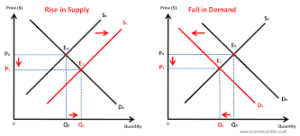April 2024 – to be precise, April 13th, 2024 – marks the 20th anniversary of Cafe Hayek’s launch. Although Cafe Hayek has been exclusively my blog for several years now, it is not my brainchild. That distinction belongs to Russ Roberts, who was then my colleague in Economics at George Mason University. Russ persuaded me to join him in blogging. We pondered names for the blog. “Cafe Hayek,” the name, is also Russ’s brainchild. When the blog was launched, I was aware that I didn’t really understand what ‘blogging’ meant or entailed. But I agreed to join Russ in this endeavor because I so very much respect his judgment and intellectual entrepreneurship.
The first eleven posts were written by Russ, with the very first one titled “Cuban Cars.” I didn’t contribute a post until six days later (on April 19th); it’s titled “Still Alive in the Long Run.” (Having just re-read it, I’m happy to report that I stand by that post.) The post you’re reading now, on April 27th, 2024, is number 18,843 for me. The total number of posts at Cafe Hayek, counting this one, is 20,983. Russ’s posts, therefore, number 2,140.
The single most popular post was written and posted on February 20th, 2016, and is titled “Most Ordinary Americans in 2016 Are Richer Than Was John D. Rockefeller in 1916.”
I’m proud to say that not a single Cafe Hayek post was ghost-written.
For a short time I ran ads on Cafe Hayek, but the sum of money the ads brought it was insufficient to justify the distractions that the ads brought to the blog.
If you’re curious, the gross income the ads brought in averaged about $100 per month. I was and remain happy annually to pay $1,200 pre-tax dollars to keep the blog commercial free. And, yes, I’m aware of the apparent irony that this blog that so very enthusiastically celebrates commerce and the profit motive is commercial-free and turns no monetary profit. I say “apparent” irony because, of course, economists who understand the importance of the material profit motive for creating, sustaining, and increasing mass economic flourishing also understand that human motivation is not limited to material – and certainly not to monetary – matters. I blog here daily because I enjoy it.
But, obviously, I’ve also gained, in many dimensions. Blogging is a low-pressure, excellent means for me to develop, clarify, and sharpen my thoughts. Also, my blogging has brought me speaking engagements – many paid! – that I would otherwise not have gotten. Much more importantly for me, my blogging has brought me friends who I would not otherwise have met. A handful of these friends are now among my dearest. They know who they are.
My intended audience for the blog consists mostly of people who are willing to allow the economic way of thinking to reveal the many marvels of our complex modern, globalized economy. Economics done well truly does supply the intellectual equivalent of X-ray vision glasses – glasses that reveal to those who wear them countless unseen realities that remain hidden to people who refuse to wear these remarkable glasses.
I especially like when students – mostly college, but sometimes high school – write to me in response to my blogging. If I were compelled to summarize this blog’s theme with very few words, it is this: “ECON 101 is vital and too-little appreciated – and it is vastly more important than is ECON 999.”
At the moment I have no plans to shut the blog down or to move over to Substack. Certainly the former will one day change, and maybe the latter will as well.
To all of my readers, I give you my deepest thanks. I’m honored – really honored – that you take time to read my pedestrian prose.
Finally, I thank the Mercatus Center. It has handled what’s under the blog’s hood. My skilled colleagues at the Mercatus Center maintain Cafe Hayek’s technical parts and aspects, about which I have no earthly idea.


 No government planned, no political authority directed, the material progress of the past four centuries, or the increasing humanity which has accompanied it. It was by a stupendous liberation of the minds and spirits and conduct of men that a world-wide exchange of goods and services and ideas was promoted, and it was in this invigorating and sustaining environment that petty principalities coalesced into great commonwealths.
No government planned, no political authority directed, the material progress of the past four centuries, or the increasing humanity which has accompanied it. It was by a stupendous liberation of the minds and spirits and conduct of men that a world-wide exchange of goods and services and ideas was promoted, and it was in this invigorating and sustaining environment that petty principalities coalesced into great commonwealths. The price of water, or the wage of the academic, is not intended by a person or group, neither by you nor by a tyrant nor by a lovely committee of wise economists. So it can no more be praised or blamed ethically than the weather or the varied gifts people have from birth or the house of the Big Bang. The phrase on many lips of “social justice,” Hayek argued, is nonsense. Society does not, in a collective, deliberative, planned human act, settle the price of water or pearls or nurses.
The price of water, or the wage of the academic, is not intended by a person or group, neither by you nor by a tyrant nor by a lovely committee of wise economists. So it can no more be praised or blamed ethically than the weather or the varied gifts people have from birth or the house of the Big Bang. The phrase on many lips of “social justice,” Hayek argued, is nonsense. Society does not, in a collective, deliberative, planned human act, settle the price of water or pearls or nurses. Several recent studies have found evidence that minimum wage increases change hiring patterns, as higher-skilled workers tend to replace lower-skilled workers. A
Several recent studies have found evidence that minimum wage increases change hiring patterns, as higher-skilled workers tend to replace lower-skilled workers. A 
